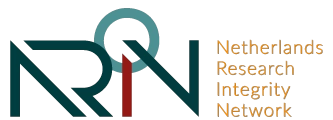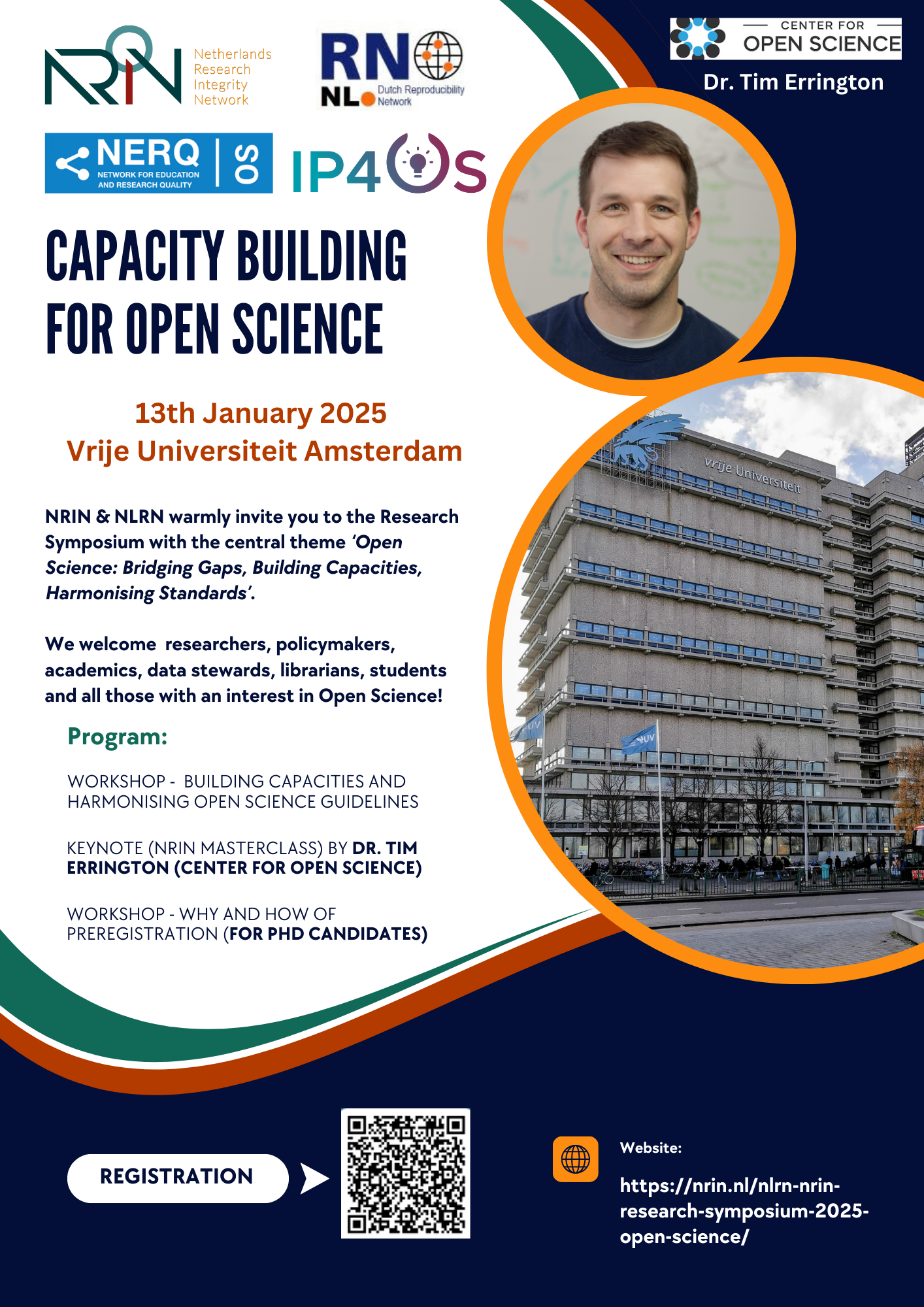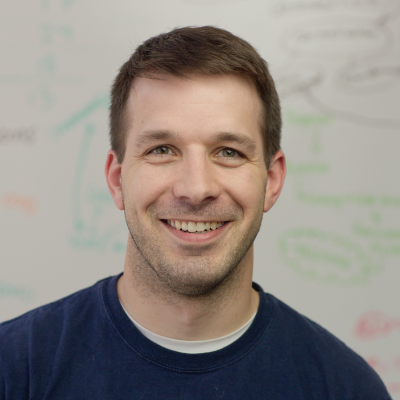Capacity Building for Open Science
The Netherlands Research Integrity Network (NRIN), in collaboration with the Dutch Reproducibility Network (NLRN), warmly invites you to attend the Research Symposium, with the central theme ‘Open Science: Bridging Gaps, Building Capacities, Harmonising Standards’, on the 13th of January 2025, at Vrije Universiteit Amsterdam (Aurora room; location here).
The Research Symposium aims to foster critical discussions among the Dutch research community on Open Science standards, practices and needs.
This event will include a workshop for Open Science educators, a keynote by Dr. Tim Errington (Senior Director of Research at the Center for Open Science) and a workshop on pre-registration for PhD candidates.
This is a free onsite event (registration is mandatory!). Dr. Tim Errington’s keynote will be recorded (NRIN Masterclass) and included on the NRIN webpage.
You are welcome to attend the entire event or only some sessions. Find more details about the individual sessions below.
Feel free to email us (info@nrin.nl) if you have any questions.
We look forward to welcoming you to our Research Symposium!
Organising Committee,
Professor Mariëtte van den Hoven, NRIN Chair
Dr. Rita F. Alves dos Santos, NRIN Coordinator
Dr. Michiel de Boer, NLRN Chair
Daniela Gawehns, NLRN Coordinator
Registration
Program
| 09:30 – 10:00 | Welcome
Dr. Michiel de Boer (chair of NLRN) Professor Mariëtte van den Hoven (chair of NRIN)
|
| 10:00 – 11:30 | Workshop – Building capacities and harmonising Open Science guidelines
Professor Julia Priess-Buchheit (Kiel University, Germany) Marie Alavi (Kiel University, Germany)
|
| 11:30 – 12:00 | Coffee break
|
| 12:00 – 13:00 | Keynote – Facilitating Research Culture change: tools, removing barriers, incentives, and norming (NRIN Masterclass)
Dr. Tim Errington (Center for Open Science)
Invited experts:
– Professor Mariska Leeflang (Amsterdam UMC) – Professor René Bekkers (VU Amsterdam) – Dr. Ewout Meijer (Maastricht University)
|
| 13:00 – 14:00 | Lunch
|
| 14:00 – 15:30 | Workshop (for PhD candidates) – How to improve your research quality: the how and why of preregistration
Dr. Tim Errington (Center for Open Science) Dr. Joeri Tijdink (Amsterdam UMC & VU Amsterdam) |
Overview of the Program
Workshop - Building capacities and harmonising Open Science guidelines
Professor Julia Priess-Buchheit & Marie Alavi (Kiel University, Germany)
This workshop will introduce the Open Science Learning Gate* developed by the Network of Education and Research Quality (NERQ) and invite participants to assess their Open Science guidelines critically. Marie and Julia will show the latest open science guidelines and educational goals trainers submitted to the GATE in the last few months. In an interactive session, participants are invited to state and discuss their own guidelines and goals with the help of the gate platform and give feedback on the suggested list of open science guidelines (the GATE suggests as the current standard).
The target audience: These can include Open Science trainers, researchers, policymakers, data curators, data stewards, data librarians, data research infrastructure support professionals, research software engineers, data scientists/analysts, enablers, and organisations.
*More information about the Open Science Learning GATE:
Community page: link
Description: link
Keynote - Facilitating Research Culture change: tools, removing barriers, incentives, and norming (NRIN Masterclass)
Research can be improved to increase efficiency in the accumulation of knowledge. This requires changes to the present culture, and a number of open science practices, such as preregistration, open data and making preprints, have been proposed to help enable this change. Requiring change though is not sufficient. A strategy to enable change is required, both to start the adoption of practices and to scale and sustain those practices. This talk will present examples of implementing culture change through focused strategies and through a more decentralized approach.
Biography
Tim Errington is the Senior Director of Research at the Center for Open Science (COS) that aims to increase openness, integrity, and reproducibility of scientific research. In that position he conducts and collaborates with researchers and stakeholders across scientific disciplines and organizations on metascience projects aimed to understand the current research process and evaluate initiatives designed to increase reproducibility and openness of scientific research. These include large scale reproducibility projects such as the Reproducibility Project: Cancer Biology and the DARPA supported Systematizing Confidence in Open Research and Evidence (SCORE), and evaluation projects of new initiatives such as open science badges, Registered Reports, and a novel responsible conduct of research training.
Errington received his PhD in Microbiology, Immunology, and Cancer Biology from the University of Virginia, MA in Molecular and Cell Biology at University of California Berkeley, and earned a BS in Biology and Chemistry at St. Lawrence University.
Workshop - How to improve your research quality: the how and why of preregistration
Dr. Tim Errington (OSF) & Dr. Joeri Tijdink (VU & Amsterdam UMC)
Tim Errington from the Center for Open Science and Joeri Tijdink will give a workshop tailored for PhD candidates, exploring why preregistration is so important and how preregistration can help you improve the quality and transparency of your research process. Preregistration—a strategy for specifying research questions, hypotheses, and analysis plans before data collection—mitigates biases such as HARKing and enhances research transparency.
In this workshop, you will learn about the benefits of preregistration, demonstrating how preregistration strengthens scientific rigor and trust in your findings. The workshop also introduces the Open Science Framework (OSF), a ready-to-use initiative that helps you manage, share, and preregister research projects. Learn how OSF supports open collaboration and promotes research quality (and reproducibility). Whether you are new to preregistration or seeking to refine your approach, this session provides actionable insights and resources to elevate your scholarly work. In this workshop, you will learn with concrete and practical advice how open science can improve your work.
Target audience: PhD candidates


